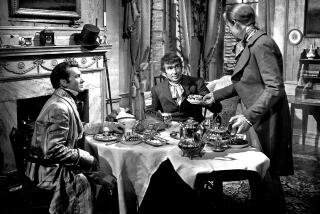AFI Life Achievement Award to Be Given to David Lean
Omar Sharif, his face caked and glistening with ice crystals, plodding through the snow to get to Julie Christie. A black dot wavering in the heated desert air, coming closer and growing larger until we see it is actually a man riding a camel. A proud Alec Guinness leading his troop of POWs through a Japanese compound as they whistle the “Col. Bogey March.”
The American Film Institute is going to have some great clips to show at its March 8 dinner next year. Sir David Lean, the director of such wide-screen epics as “Doctor Zhivago,” “Lawrence of Arabia” and “The Bridge on the River Kwai,” has been named by the institute as the 18th recipient of its prestigious Life Achievement Award.
The 81-year-old Englishman, who is still looking ahead to his planned adaptation of the Joseph Conrad novel “Nostromo,” is the eighth director and the first foreigner to be honored by the AFI since it began presenting its “living legend” award in 1973.
Director John Ford was the AFI’s first Life Achievement Award recipient and Gregory Peck its most recent. In between, the honor--presented at a glamorous A-list Hollywood dinner that is taped for later network broadcast--has gone to such actors as James Cagney, Lillian Gish, Bette Davis, Fred Astaire, Gene Kelly and Barbara Stanwyck, and to directors Orson Welles, Alfred Hitchcock, Billy Wilder, William Wyler, John Huston and Frank Capra.
“Lean joins a distinguished group of individuals who have made enormous contributions to America’s film heritage,” said AFI chairman Gene Jankowski in announcing the name of the institute’s 1990 winner.
Lean, a Quaker who was not allowed to see movies as a child, stepped through the looking glass at the age of 19 when he got a job serving tea at an English studio and actually had to rise to the job of gofer. He later finagled work as an assistant film editor, working on newsreel footage captured during the early ‘30s, and was the credited film editor on the 1938 “Pygmalion.”
His began his directing career doing the action sequences for the 1942 war film “In Which We Serve,” but his first step toward an AFI award came with his 1945 adaptation of Noel Coward’s “Brief Encounter.” The film earned the then 37-year-old Lean the first of six Oscar nominations.
He received his second nomination the following year for “Great Expectations,” and 10 years later began a streak that included nominations for “The Bridge on the River Kwai” (1957), “Lawrence of Arabia” (1962), “Dr. Zhivago” (1965), and “A Passage to India” (1984). He won the Oscar for “Kwai” and “Lawrence.”
The only film he has done since 1957 that did not earn him an Academy Award nomination was the 1970 Irish landscape spectacle “Ryan’s Daughter.”
Critics are divided on Lean’s overall position on the honor roll of film directors. Certainly, his epics show the deliberateness of a visual stylist and a meticulous storyteller; Lean has managed only 16 movies in 47 years of directing.
For Hollywood, he was definitely the right director at the right time. With television spawning America’s first generation of couch potatoes, the big screen had to get a lot bigger, and with “The Bridge on the River Kwai,” Lean gave audiences plenty to look at while managing to keep the story as big as the image.
Lean has not worked as much as he might have liked in the last two decades, because of the prohibitive costs of his kind of spectacle. For years, he and his writing collaborator, Robert Bolt, were planning an authentic historical version of “Mutiny on the Bounty.” At one time, it was going to be done as two movies, each one costing about $30 million, then as an eight-hour miniseries.
Lean abandoned the project when it was clear no one would put up the money he needed to realize his vision. The film was eventually made in 1984 by director Roger Donaldson for Orion Pictures under the title “The Bounty.”
More to Read
Only good movies
Get the Indie Focus newsletter, Mark Olsen's weekly guide to the world of cinema.
You may occasionally receive promotional content from the Los Angeles Times.










